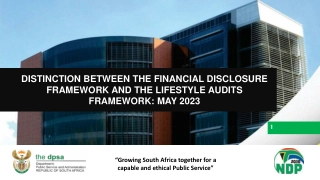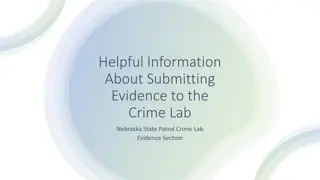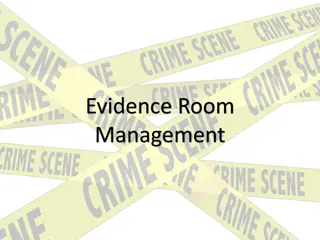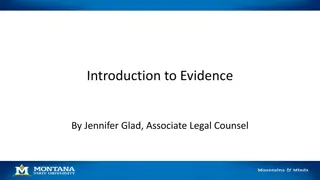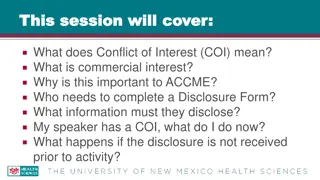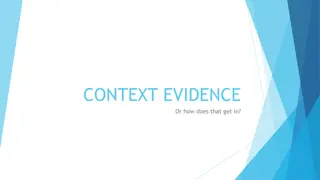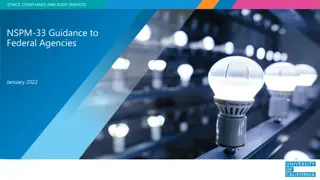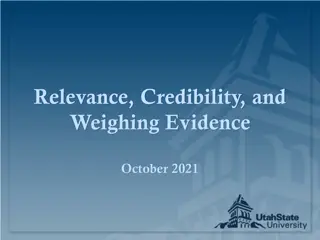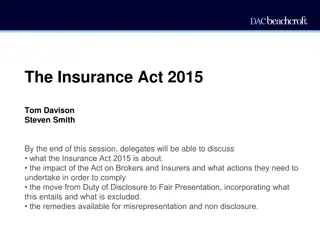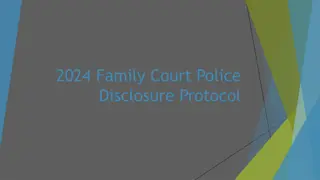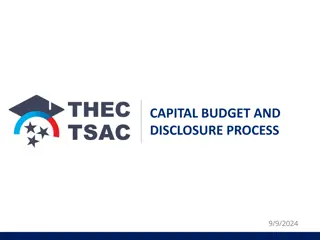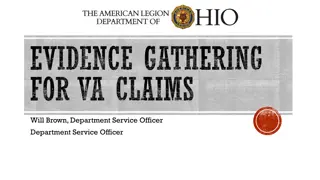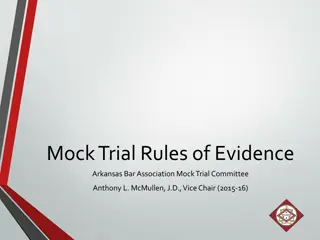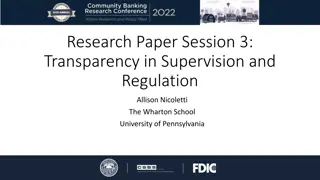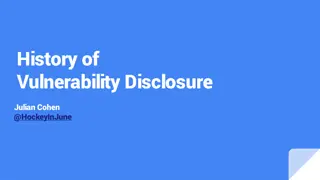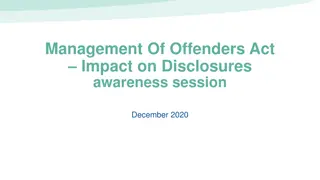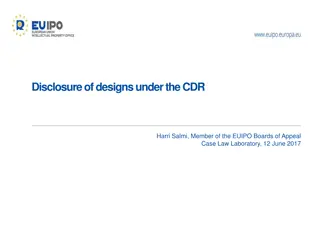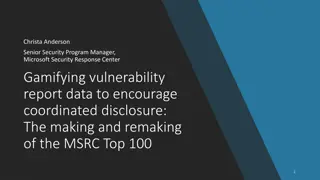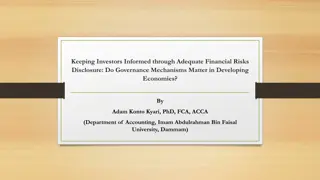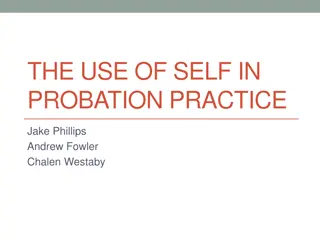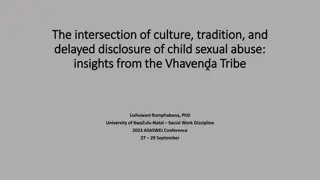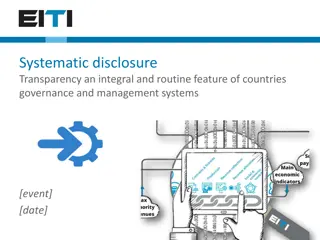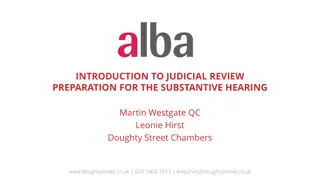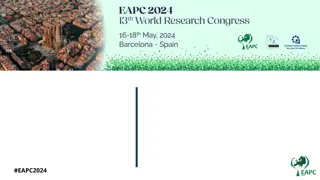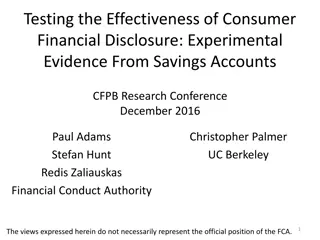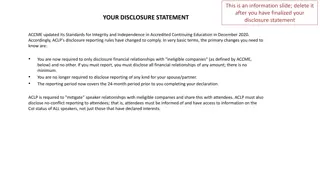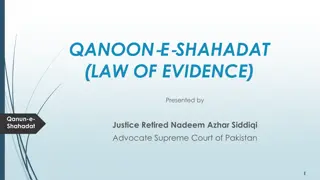Understanding Financial Disclosure and Lifestyle Audits Frameworks
The financial disclosure framework was introduced in 2016 by the Minister for the Public Service and Administration to manage conflict of interest situations in the public service. Designated employees disclose their financial interests annually via the eDisclosure system, and these disclosures are
1 views • 11 slides
The Role of Artifacts and Evidence in Educator Evaluation and Support
Exploring the role of artifacts and evidence in educator evaluation, this content covers the three categories of evidence required by the Oregon Framework. It delves into the efficient process that reduces redundancy, essential components of SLG goals, and the types of evidence relevant to professio
0 views • 15 slides
Understanding Impression Evidence Collection in CSI Investigations
Impression evidence plays a crucial role in investigations, including shoeprints, tool marks, tire tracks, bite marks, and riffling marks on bullets. This evidence can be collected in 2D using photography or tape lifts, and in 3D through casting methods. Differentiating between class and individual
0 views • 21 slides
Helpful Information About Submitting Evidence to the Crime Lab.
Helpful information about submitting evidence to the Nebraska State Patrol Crime Lab's Evidence Section. Learn about the NSP 750 Evidence Submittal Form, submission process, and guidelines for resubmissions. Ensure all necessary details are provided for proper analysis of evidence.
5 views • 16 slides
Illegally obtained evidence
Illegally obtained evidence refers to evidence acquired through unlawful means, such as searches without warrants or extraction under duress. The Fruit of the Poisonous Tree doctrine renders evidence inadmissible if derived from illegally obtained evidence. The Exclusionary Rule prohibits the use of
2 views • 30 slides
Evidence Room Management
Explore the intricacies of evidence room management in a law enforcement setting, including the roles of individuals like Greg Van Buskirk, differences in crime scene management between large and small departments, the distinction between property and evidence, the importance of maintaining chain of
0 views • 8 slides
Understanding Evidence in Investigations
Learn about the principles and types of evidence in investigations, including inculpatory and exculpatory evidence, physical, documentary, demonstrative, and verbal evidence. Explore sources of evidence and the significance of collecting relevant information to ensure a fair investigative process.
0 views • 14 slides
Understanding Conflict of Interest in ACCME Accredited Activities
Conflict of Interest (COI) refers to financial relationships that may create biases in Continuing Medical Education (CME) activities when individuals have ties to commercial interests and can influence the content. ACCME requires disclosure to prevent potential bias in CME content. Non-disclosure ca
0 views • 18 slides
Understanding Context Evidence in Legal Proceedings
Context evidence in legal proceedings refers to evidence of acts not charged in the indictment, used to provide a background for understanding specific allegations. This type of evidence is often relied upon by the prosecution to explain events or behaviors that may seem isolated or surprising. It i
1 views • 13 slides
Federal Agencies Guidance on Ethics, Compliance, and Audit Services under NSPM-33
The White House OSTP released guidance for federal agencies to implement NSPM-33 focusing on disclosure requirements, digital identifiers, consequences for violations, information sharing, and research security programs. The guidance emphasizes supporting open scientific inquiry and nondiscriminator
0 views • 10 slides
Understanding Evidence-Based Medicine and Clinical Decision-Making
European Patients Academy on Therapeutic Innovation emphasizes the importance of Evidence-Based Medicine (EBM) in providing optimum clinical care. EBM involves systematic review and utilization of clinical research for informed decision-making, benefiting patients in disease management and treatment
7 views • 20 slides
Understanding Relevance, Credibility, and Weighing Evidence in Decision-Making
Explore the importance of relevance and credibility in evidence assessment, the role of hearing panels in evaluating evidence fairly, and the responsibilities they hold. Learn about presenting relevant evidence, policy analysis, and identifying irrelevant evidence to ensure a thorough review process
6 views • 32 slides
Understanding the Impact of the Insurance Act 2015 on Brokers and Insurers
The Insurance Act 2015 brings significant changes in insurance contract law, shifting from Duty of Disclosure to Fair Presentation. This Act influences both Brokers and Insurers, requiring clear and accessible disclosure of material circumstances. The remedies for misrepresentation and non-disclosur
0 views • 19 slides
Mastering Claims, Evidence, and Warrants for Persuasive Writing
Understanding the concepts of claims, evidence, and warrants is crucial for constructing persuasive arguments. Claims represent positions to persuade, evidence supports claims with facts, and warrants bridge the gap between evidence and claims. An exercise is outlined to help practice forming claims
0 views • 8 slides
Updated Disclosure Rules for Financial Relationships in Continuing Education
ACCME updated its Standards for Integrity and Independence in Continuing Education, requiring disclosure of financial relationships with specific "ineligible companies" by all involved parties. The rules aim to enhance transparency and mitigate conflicts of interest in accredited continuing educatio
1 views • 5 slides
Understanding Disability Disclosure in Employment: Practical and Ethical Considerations
This presentation touches on the practical and ethical issues supported employment professionals face when dealing with disability disclosure. The agenda includes ADA provisions, successful disclosure strategies, the professional's role in the process, and available resources. The session covers dis
0 views • 33 slides
Understanding Disclosure of Adverse Clinical Events in Healthcare
Exploring the essential elements of disclosing adverse clinical events to patients and families in healthcare settings. It covers why disclosure is crucial, barriers to disclosure, triggers for disclosure, policies and procedures, and the other important aspects related to the disclosure process.
0 views • 8 slides
Enhanced Family Court Police Disclosure Protocol for 2024
The 2024 Family Court Police Disclosure Protocol addresses key issues identified in the 2013 protocol, emphasizing timely and proportionate requests for material. Changes include a new checklist for the judiciary, guidance notes, and revised processes for litigants in person. The protocol provides c
1 views • 19 slides
Understanding the Capital Budgeting and Disclosure Process
This content provides a comprehensive overview of the capital budgeting and disclosure process, focusing on fiscal years, budget terms, and the sequential steps involved in the capital budget process. It explains the timeline from the Governor's capital budget release to the final approval by the go
2 views • 23 slides
Example of COI Disclosure Formats in Academic Presentations
These images provide examples of Conflict of Interest (COI) disclosure formats for oral and poster presentations in academic settings. They outline how authors can disclose any potential COIs in relation to their work over the past three years, including details on employment, stock ownership, paten
1 views • 4 slides
Detailed Guidance and Requirements for Implementing NSPM-33
The update provides detailed guidance on implementing NSPM-33's disclosure requirements and other provisions discussed in the January 2022 CLASP Meeting. It includes areas such as disclosure requirements, digital persistent identifiers, consequences for violations, information sharing, and research
1 views • 19 slides
Understanding Biased Assimilation and Attitude Polarization in Social Disputes
People with strong opinions on complex social issues tend to interpret evidence in a biased manner, accepting confirming evidence readily while subjecting disconfirming evidence to critical evaluation. This can lead to increased polarization rather than narrowing of disagreement when exposed to the
0 views • 20 slides
Transformation of Quality Assessment Framework in Healthcare
The healthcare quality assessment framework is evolving with a new strategy focused on data-led, people's experiences, care integration, and safety culture. The current framework is transitioning towards a new approach by late 2023, incorporating separate registration and monitoring processes, five
0 views • 14 slides
Understanding Evidence Gathering for VA Claims with The American Legion Department of Ohio
Evidence is crucial for VA claims, and it can come in various forms such as documents, written statements, photos, and video recordings. The framework for evaluating evidence includes factors like relevance, competence, credibility, and weight. Understanding the types of evidence, forms of relevance
0 views • 14 slides
Understanding Mock Trial Rules of Evidence
Mock Trial Rules of Evidence are crucial for determining the admissibility of testimony and evidence in a trial setting. Students preparing for cases need to assess evidence admissibility, make timely objections, and be prepared to defend testimony. The rules cover objections, specific objections ty
0 views • 36 slides
Transparency in Banking: Examining Disclosure and Regulation
Discussion on the importance of transparency in the banking industry, focusing on the level of information disclosure by banks and its impact on market discipline, lending practices, and regulatory intervention. Papers explore different facets of transparency, including the disclosure audience, natu
0 views • 10 slides
Evolution of Vulnerability Disclosure Practices
The history of vulnerability disclosure, from the early days of mailing lists and zines to the emergence of Full Disclosure and the debates around anti-disclosure groups. The timeline covers key events like the Morris worm, Code Red, the founding of Bugcrowd, and more, illustrating the evolution of
0 views • 11 slides
Impact of Management of Offenders Act on Disclosure Awareness Session
On 30 November 2020, new legislation including the Age of Criminal Responsibility (Scotland) Act 2019 and the Management of Offenders (Scotland) Act 2019 came into force, transforming the disclosure system in Scotland. These changes raise the age of criminal responsibility, reduce rehabilitation per
0 views • 10 slides
Practice and Procedure in Judicial Review: Factual Evidence and Interveners
The content provides valuable insights into the practice and procedure regarding factual evidence and interveners in judicial review cases. It covers general rules, recent cases, applications for oral evidence, questioning witnesses, opinion evidence, and the role of interveners. Key points include
0 views • 28 slides
Understanding Disclosure of Designs under CDR - Key Insights
The article explores the disclosure of designs under the Community Design Regulation (CDR) and Community Design Invalidity Regulation (CDIR). It discusses the criteria for public availability, evidence required for proving prior disclosure, and the basic rules for establishing the disclosure of a pr
0 views • 9 slides
Gamifying Vulnerability Reporting for Coordinated Disclosure at Microsoft Security Response Center
Christa Anderson, a Senior Security Program Manager at Microsoft's Security Response Center, discusses the importance of gamifying vulnerability report data to encourage coordinated disclosure. The MSRC Top 100, announced at Black Hat USA, plays a crucial role in the public credit strategy by recogn
0 views • 13 slides
Governance Mechanisms and Financial Risks Disclosure in Developing Economies
Examining the impact of governance mechanisms on financial risk disclosure in developing economies, this study delves into theories, literature reviews, findings, policy implications, and conclusions. The research emphasizes the importance of adequate risk disclosure for investor trust and regulator
0 views • 9 slides
The Use of Self in Probation Practice: Understanding Self-Disclosure and Its Implications
Explore the concept of self-disclosure in probation practice, examining different methods, findings, and implications. Discover the two schools of thought regarding self-disclosure and delve into the various realms and subtypes of self-disclosure practices. Gain insights into the forms of self-discl
0 views • 25 slides
Understanding Cultural Influence on Delayed Child Sexual Abuse Disclosure in the Vhavena Tribe
Exploring the intersection of culture, tradition, and delayed disclosure of child sexual abuse within the Vhavena Tribe. The study delves into the complexities of disclosure, the unique context of CSA in cultural norms, and behaviors, guided by the Afrocentric theory. Methodology involves interviews
0 views • 15 slides
Enhancing Governance through Systematic Disclosure and Transparency
Systematic disclosure and transparency play a crucial role in the governance and management systems of countries. This involves routine disclosure of information, such as financial data, to promote accountability and address gaps in information. The EITI Standard emphasizes the importance of mainstr
0 views • 23 slides
Overview of Judicial Review Preparation for Substantive Hearing
Post-permission steps in judicial review cases involve various crucial aspects such as interim applications, evidence disclosure, preparation for hearing, and post-hearing procedures. This includes payment of fees, filing of defense grounds and evidence, scheduling, exchange of arguments, and compli
0 views • 21 slides
Conflict of Interest Disclosure for EAPC 2024 Congress
This disclosure statement outlines the conflict of interest policy for speakers at the EAPC 2024 Congress. Speakers are required to disclose any affiliations or financial interests that may potentially influence their presentations. The purpose of the disclosure is to inform attendees so they can ev
0 views • 4 slides
Testing Effectiveness of Consumer Financial Disclosure: Experimental Evidence
This study explores the impact of consumer financial disclosure on savings accounts, investigating the importance of design and presentation. It questions whether optimized disclosures can enhance consumer outcomes and delves into the challenges posed by consumer inertia. The UK savings market backg
0 views • 24 slides
New Disclosure Rules for Continuing Education
ACCME updated its Standards for Integrity and Independence in Accredited Continuing Education in December 2020, leading to changes in ACLP's disclosure reporting rules. Key changes include reporting only financial relationships with "ineligible companies," extending the reporting period to 24 months
0 views • 5 slides
Understanding Qanun-e-Shahadat: Law of Evidence in Pakistan
Qanun-e-Shahadat Order 1984 replaced the Evidence Act of 1872 in Pakistan, aiming to align the law of evidence with Islamic principles. This law is crucial for judicial proceedings, governing the admissibility of oral and documentary evidence, primary and secondary evidence, and resolving conflicts
0 views • 22 slides
